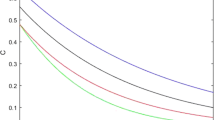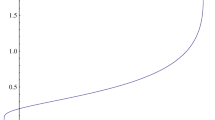Abstract
Monogamy and polygamy are important properties of entanglement, which characterize the entanglement distribution of multipartite systems. We study general monogamy and polygamy relations based on the \(\alpha \)th \((0\le \alpha \le \gamma )\) power of entanglement measures and the \(\beta \)th \((\beta \ge \delta )\) power of assisted entanglement measures, respectively. We illustrate that these monogamy and polygamy relations are tighter than the inequalities in the article Jin et al. (Quantum Inf Process 19:101, 2020), so that the entanglement distribution can be more precisely described for entanglement states that satisfy stronger constraints. For specific entanglement measures such as concurrence and the convex-roof extended negativity, by applying these relations, one can yield the corresponding monogamous and polygamous inequalities, which take the existing ones in the articles Zhu and Fei (Quantum Inf Process 18:23, 2019) and Jin et al. (Quantum Inf Process 18:105, 2019) as special cases. More details are presented in the examples.



Similar content being viewed by others
Data availability
All data generated or analyzed during this study are included in this published article.
References
Mintert, F., Ku\(\acute{s}\), M., Buchleitner, A.: Concurrence of mixed bipartite quantum states in arbitrary dimensions. Phys. Rev. Lett. 92, 167902 (2004)
Chen, K., Albeverio, S., Fei, S.M.: Concurrence of arbitrary dimensional bipartite quantum states. Phys. Rev. Lett. 95, 040504 (2005)
Breuer, H.P.: Separability criteria and bounds for entanglement measures. J. Phys. A Math. Gen. 39, 11847 (2006)
Breuer, H.P.: Optimal entanglement criterion for mixed quantum states. Phys. Rev. Lett. 97, 080501 (2006)
de Vicente, J.I.: Lower bounds on concurrence and separability conditions. Phys. Rev. A 75, 052320 (2007)
Zhang, C.J., Zhang, Y.S., Zhang, S., Guo, G.C.: Optimal entanglement witnesses based on local orthogonal observables. Phys. Rev. A 76, 012334 (2007)
Bennett, C.H., Brassard, G., Crépeau, C., et al.: Teleporting an unknown quantum state via dual classical and Einstein–Podolsky–Rosen channels. Phys. Rev. Lett. 70, 1895 (1993)
Boyer, M., Ran, G., Dan, K., et al.: Quantum key distribution. Phys. Rev. A 79, 032341 (2016)
Raussendorf, R., Briegel, J.H.: A one-way quantum computer. Phys. Rev. Lett. 86, 5188 (2001)
Gour, G.: Family of concurrence monotones and its applications. Phys. Rev. A 71, 012318 (2005)
Wootters, W.K.: Entanglement of formation of an arbitrary state of two qubits. Phys. Rev. Lett. 80, 2245 (1998)
Eltschka, C., Siewert, J.: Quantifying entanglement resources. J. Phys. A Math. Theor. 47, 424005 (2014)
Coffman, V., Kundu, J., Wootters, W.K.: Distributed entanglement. Phys. Rev. A 61, 052306 (2000)
Osborne, T.J., Verstraete, F.: General monogamy inequality for bipartite qubit entanglement. Phys. Rev. Lett. 96, 220503 (2006)
Bai, Y.K., Zhang, N., Ye, M.Y., et al.: Exploring multipartite quantum correlations with the square of quantum discord. Phys. Rev. A 88, 012123 (2013)
Bai, Y.K., Xu, Y.F., Wang, Z.D.: General monogamy relation for the entanglement of formation in multiqubit systems. Phys. Rev. Lett. 113, 100503 (2014)
Zhu, X.N., Fei, S.M.: Entanglement monogamy relations of qubit systems. Phys. Rev. A 90, 024304 (2014)
Ou, Y.C., Fan, H.: Monogamy inequality in terms of negativity for three-qubit states. Phys. Rev. A 75, 062308 (2007)
Kim, J.S., Das, A., Sanders, B.C.: Entanglement monogamy of multipartite higher-dimensional quantum systems using convex-roof extended negativity. Phys. Rev. A 79, 012329 (2009)
He, H., Vidal, G.: Disentangling theorem and monogamy for entanglement negativity. Phys. Rev. A 91, 012339 (2015)
Jin, Z.X., Fei, S.M.: Tighter entanglement monogamy relations of qubit systems. Quantum Inf. Process. 16, 77 (2017)
Jin, Z.X., Li, J., Fei, S.M., et al.: Tighter monogamy relations in multiqubit systems. Phys. Rev A 97, 032336 (2018)
Yang, L.M., Chen, B., Fei, S.M., Wang, Z.X.: Tighter constraints of multiqubit entanglement. Commun. Theor. Phys. 71 (2019)
Liu, W.W., Yang, Z.F., Fei, S.M.: Tighter monogamy and polygamy relations of quantum entanglement in multi-qubit systems. Int. J. Theor. Phys. 60, 4177 (2021)
Gour, G., Meyer, D.A., Sanders, B.C.: Deterministic entanglement of assistance and monogamy constraints. Phys. Rev. A 72, 042329 (2005)
Gour, G., Bandyopadhyay, S., Sanders, B.C.: Dual monogamy inequality for entanglement. J. Math. Phys. 48, 012108 (2007)
Kim, J.S.: General polygamy inequality of multi-party quantum entanglement. Phys. Rev. A 85, 062302 (2012)
Kim, J.S.: Negativity and tight constraints of multiqubit entanglement. Phys. Rev. A 97, 012334 (2018)
Jin, Z.X., Fei, S.M.: Finer distribution of quantum correlations among multiqubit systems. Quantum Inf. Process. 18, 21 (2019)
Zhu, X.N., Fei, S.M.: Monogamy properties of qubit systems. Quantum Inf. Process. 18, 23 (2019)
Jin, Z.X., Fei, S.M., Qiao, C.F.: Polygamy relations of multipartite systems. Quantum Inf. Process. 18, 105 (2019)
Jin, Z.X., Fei, S.M., Qiao, C.F.: Complementary quantum correlations among multipartite systems. Quantum Inf. Process. 19, 101 (2020)
Uhlmann, A.: Fidelity and concurrence of conjugated states. Phys. Rev. A 62, 032307 (2000)
Wootters, W.K.: Entanglement of formation of an arbitrary state of two qubits. Phys. Rev. Lett. 80, 2245 (1998)
Vidal, G., Werner, R.F.: Computable measure of entanglement. Phys. Rev. A 65, 032314 (2002)
Luo, Y.: Monogamy of \(\alpha \)th power entanglement measurement in qubit systems. Ann. Phys. 362, 511 (2015)
Acin, A., Andrianov, A., Costa, L., Jane, E., Latorre, J.I., Tarrach, R.: Generalized Schmidt decomposition and classification of three-quantum-bit states. Phys. Rev. Lett. 85, 1560 (2000)
Jin, Z.X., Fei, S.M.: Superactivation of monogamy relations for nonadditive quantum correlation measures. Phys. Rev. A 99, 032343 (2019)
Acknowledgements
This work is supported by the NSF of China under Grant Nos. 12175147, 12171044.
Author information
Authors and Affiliations
Corresponding author
Ethics declarations
Conflict of interest
The authors declare no competing interests.
Additional information
Publisher's Note
Springer Nature remains neutral with regard to jurisdictional claims in published maps and institutional affiliations.
Rights and permissions
Springer Nature or its licensor (e.g. a society or other partner) holds exclusive rights to this article under a publishing agreement with the author(s) or other rightsholder(s); author self-archiving of the accepted manuscript version of this article is solely governed by the terms of such publishing agreement and applicable law.
About this article
Cite this article
Xie, B., Zhao, MJ. & Li, B. General monogamy and polygamy properties of quantum systems. Quantum Inf Process 22, 124 (2023). https://doi.org/10.1007/s11128-023-03861-1
Received:
Accepted:
Published:
DOI: https://doi.org/10.1007/s11128-023-03861-1




